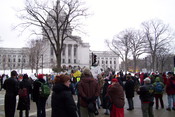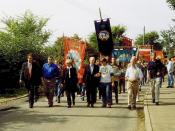Strikes and Alternative Forms of Coping
Are strikes the most beneficial way of resolving labour - management conflict? Or are alternative forms of coping more beneficial?. Throughout this paper I will attempt to answer these questions by, first giving a description of each of these forms of coping. Then I will examine the effects, both positive and negative, that each of these forms of coping has on the collective bargaining process as well as the labor - management relationship. Finally I will compare the effectiveness of strikes as opposed to the effectiveness of alternative forms of coping.
A strike occurs when unionized workers collectively agree to stop working in order to try and force management to agree to a new collective bargaining agreement. Under the law a strike can only occur if the existing collective bargaining agreement has expired and generally strikes do not occur unless labour and management have reached a stalemate in the contract negotiations.
Negotiations often stall for a number of reasons, but the most common reasons are wage and benefit levels. Often both sides over estimate the other sides willingness to concede and when both sides have given all they are willing to give without reaching a compromise, a stalemate is reached. During a stalemate both sides try to convince the other that they are unable give any more. In order to show there determination unionized workers often decide to go strike, and will stay on strike until management is ready to give in to their demands. The workers determine whether or not they feel the need to strike, by a strike vote. If the majority of workers are in favor of going on strike then the union declares a day and time that an agreement must be reached, or there workers will walk off...



Great essay!
Don't understand the rating, but I guess it's people scared of Cheathouse admit for voting differently. This is a great essay, and deserves a great rating.
1 out of 1 people found this comment useful.